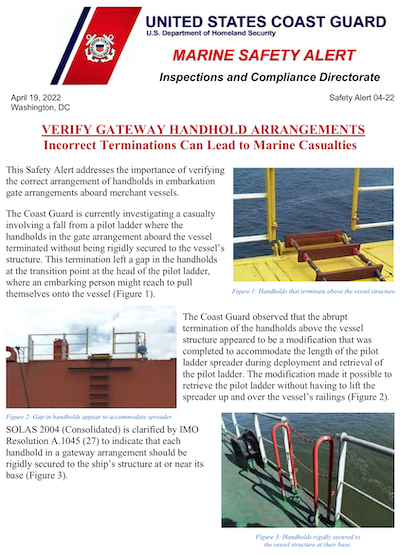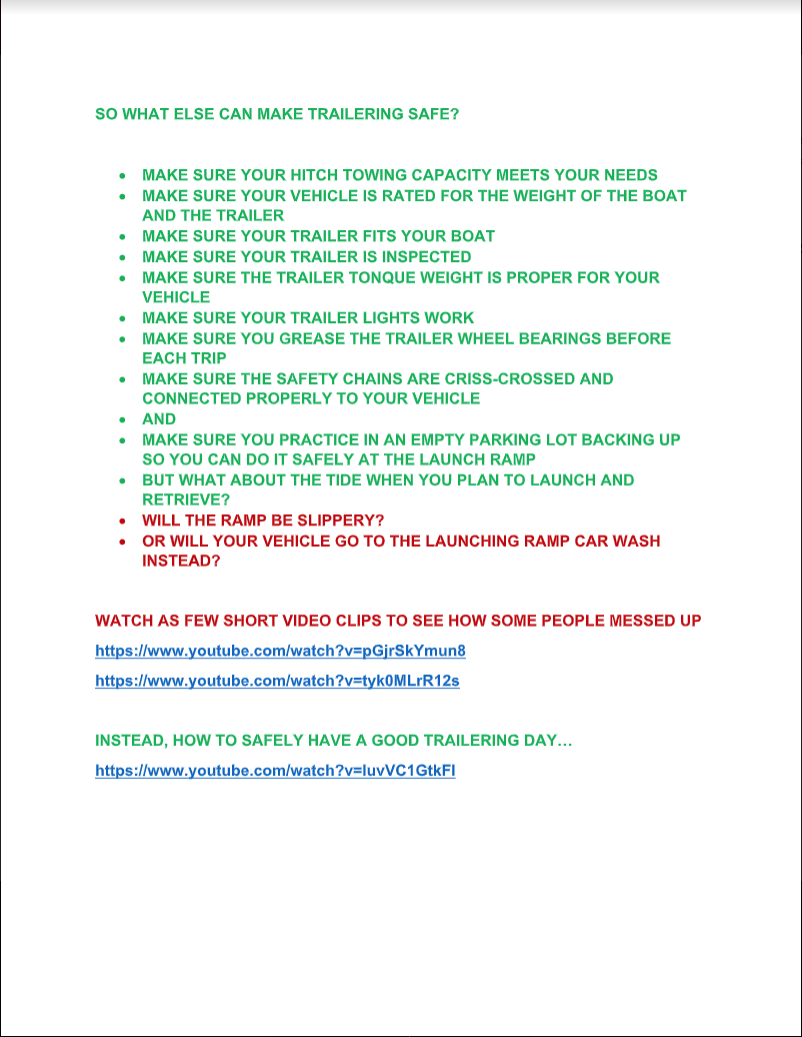Return to District 1SR's Home Page.

Auxiliary Aviation Safety Tips
Deadstick Landiong, Cessna 205 Forced Land at Hillsboro ORE. (Feb 2020)
Five Emergency Procedures Every Pilot Should be Prepared for
Margin of Safety: Avoiding Power on Stalls.
AuxAIR Safety
Joseph A. Costanzo, ADSO-AVT-FP-VO/UPV.
Ladder Safety
Be Smart / Be Safe / Be Cautious
Stu Cohen, Asst D1SR Health & Safety Officer.
Hypothermia Safety Tips
Around this time each year we see cases of hypothermia occurring more frequently. But I'm not only talking about boating exposures. I'm talking about hypothermia from landslide exposures as well. Whether someone is on a boat, working outside, or just walking in the woods, the drops in temperatures this time of the year may fool you.
Be Smart / Be Safe / Be Cautious
Stu Cohen, Asst D1SR Health & Safety Officer.
People in the water, how would you respond?
In the boat crew program, we train in simulated man overboard drills as part of our regular training. Below are two separate videos of people in the water that are real events.
In one event, a man fell off the North Jetty at Miami's Haulover Inlet. Had people on a boat not been paying attention to their surroundings, "situational awareness", this poor man would have died. But the people on the boat did pay attention and he lived.
In another event an in poor inlet conditions with the wind and the tide opposing each other, jet skiers fell off of the ire PWC. The choppy inlet looked like 3-4 footers with some 5-7's. A very tough rescue was undertaken by some sharp PWC operators. Credit should be given to their professional and navigational skills.
So when we go out to do training, consider events that are out of the ordinary but could dramatically change a day from routine to a storytelling day. Situational awareness and sharpening our skills go hand in hand. But also recognize that sometimes our egos are bigger than our skills so if it isn't safe, then don't be a victim and add to the distress.
The morale is that practice build skills and it also builds confidence in your skills..they both go hand in hand...
The first video show that man drowning at minute 2:40.
The second video shows the jet skiers in the water throughout the entire video.
Listen to the man on the South Jetty calling for help on his cell phone to see how dire the situation is.
Be Smart / Be Safe / Be Cautious
Stu Cohen, Asst D1SR Health & Safety Officer.
Boat Fire Safety Tips
We teach fire prevention in our PE classes. We inspect boats during our VE courtesy exams. But there is a lot more to what we do. Do we really know how to use a fire extinguisher in the best way?
Do we recognize that a cabin or an engine space may also be a confined space?
Boating Safety Magazine - Fire On Board!
This website covers a lot of information. But there are also members who conduct inspections on commercial fishing vessels too? Check out the attached USCG investigation report.
Be Smart / Be Safe / Be Cautious
Stu Cohen, Asst D1SR Health & Safety Officer.
Safety when Transiting Ocean Inlets
A few key points
- Trim your bow up so that waves you take on won't swamp you.
- Even if you have a bowrider or seating up forward, get passengers to move aft.
- Goin too slow through an inlet may be worse than picking up your speed.
- Assess the waves so you don't take them head on when outgoing.
- When returning in, stay just behind the top of the wave to avoid pitch poling.
- Avoid heading out if you know you have to come back in at low tide.
- Assess an outgoing tide with an offshore wind; wind against the tide may be too hazardous to go out.
A few of the videos are showing instructors who are experts in inlet running. Watch and listen to their discussion. And of course, never let your ego guide you into dangerous situations.
For those in my neck of the woods, Jones Inlet has severe shoaling, much worse than in years past. At low tide, there are spots where you only have five feet of water. If you are in the inlet and there is a two-three foot chop or swell, you do the math.
Be Smart / Be Safe / Be Cautious
Stu Cohen, Asst D1SR Health & Safety Officer.
New Zealand Bar Crossing - How to cross a bar safely in a trailer powerboat
How to Cross Coastal Bars Safely
Port of New York & New Jersey Boating Harbor Guide
Manasquan Inlet Dangerous Offshore Winds and Outgoing Tides


